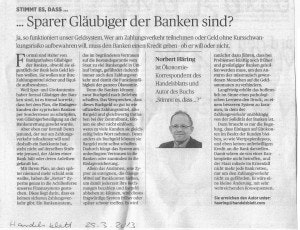Is It True That Savers Are the Banks’ Creditors?

The German Business Daily Handelsblatt published an excellent article entitled “Is It True That Savers Are the Banks’ Creditors?” on 25th March 2013, written by Norbert Häring.
Here you can read the translation:

Yes, that’s how our monetary system works – savers are the banks’ creditors. Anyone wanting to participate in payment transactions or save money without risk of fluctuation must give a bank credit – whether they like it or not.
Technically, deposit holders are the banks’ creditors, even if they don’t really want to lend the bank their money and only care for their deposits’ safety and liquidity.
Since savers are formally the banks’ creditors, it is technically correct to talk of the planned levy on Cypriot bank savings in terms of creditor participation in the bailout.
But only technically! Someone who merely uses their account for payment transactions can not be placed in the same category as the bank’s shareholders and bond owners.
The “saviors” of Cyprus have stung the Achilles’ heel of our financial system. This lies in the fact that there is no secure payments system. A banking sector that creates excessive credit on the back of its reliance on state guarantees will always also jeopardise the payments system and hence the whole economy’s ability to function.
The banks can indeed create digital money at will. However, if too many customers all at once took the banks at their word, the assurance that this money is as good as legal tender and equivalent to credit from the central bank could not be held. For while they can create digital money, banks cannot produce hard cash. The system, then, relies on blind trust in the banks, or at least in the guarantee of their deposits.
The demand to expropriate the savers in Cyprus will sooner or later take its toll on this questionable system. For a start, it will lead to a situation where problems in the future will have to be countered with earlier and bigger bailouts in order to prevent a run of suspicious people on ATMs.
In the long term, this will hopefully put on the pressure to come up with a better arrangement, one in which the payments system no longer depends on the banks’ solidarity.
The only requirement for this to happen is that deposits on current accounts, as well as securities, remain the customers’ property and cease to function as involuntary loans to the banks. That way they would be unaffected by bank bankruptcies, so that in case of a crisis, the state would no longer be forced to bail out banks just to safeguard the payments system. It would be a small change with very wide-reaching effects.
Translated from the German by Yannis Tsitsovits.